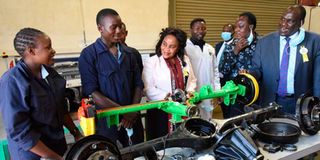Premium
Go on, enroll in vocational centres, there are jobs

Dr Margaret Mwakima, Principal Secretary for Vocational and Technical Training (centre), Sheillah Makori (left) and Steve Nato, mechanics students at the Eldoret National Polytechnic during the institution’s 10th Annual International Conference in June.
Enrolment in technical vocational centres in Nyeri County has sharply dropped over the last two years despite heavy investment by the county government to offer training opportunities for Form Four leavers.
The trainee numbers have gone down by nearly 1,000 within the period. In 2019, there were 2,910 students enrolled in the 39 vocational centres in the county, currently, there are only 1,830.
High levels of unemployment in the county has seen the government invest generously on technical skills in the hope of giving youths the skills to seek and create blue collar jobs, therefore the downward trend is worrying.
The vocational centres, also referred to as youth polytechnics, offer training in technical skills such as electrical courses, plumbing, food and beverage, mechanical, carpentry and joinery, welding, fashion and design and ICT.
Nyeri County executive member in charge of the Education Department, Margaret Macharia, told Higher Education that a negative perception towards the courses offered by the centres has been the biggest hindrance to growing their enrolment.
According to her, many students prefer to remain at home rather than take the hands-on courses although they cannot get admission for degree and diploma courses.
100 per cent transition
“There are institutions that have a good number of students, for instance Nairutia, Karatina and Othaya, but we had to do a lot of sensitisation and civic education to get them to enrol,” she says.
Further, the 100 per cent transition from primary to secondary schools, although commendable, has negatively affected the institutions. Before the government adopted the policy, many learners who dropped out of primary school would enrol in the youth polytechnics to acquire skills that they could use to find jobs or go into self-employment. The vocational centres now have to rely on secondary school leavers, many of whom shun them.
“Those who complete their secondary education could gain the skills, and that way, even when they leave college, they do not have to tarmac looking for jobs,” she adds.
“We are also facing a lot of competition from the national technical vocational education and training institutions (TVETs) which are better equipped, hence admit a huge chunk of the students,” Ms Macharia adds, pointing out that county vocational centres were struggling with lack of funding, making it difficult to fully equip the institutions.
Boarding facilities
Another challenge working against them is the fact that some of the learning centres were located in the same area as TVETs which offered similar courses, furthermore, the better equipment and boarding Enrolment is however higher where there are boarding facilities.
Ms Macharia called for youths to enrol in the vocational centres whatever their academic qualifications, insisting that the demand for skilled labour is on the rise.
“People who have come from technical institutions do not look for employment, it finds them. A skilled mason takes home a minimum of Sh2,000 per day and since buildings are still coming up, they are employed all through,” she said.
That was the reasoning behind the national government’s strategy to open a TVET institution in every constituency in the country and also the funding of technical vocational centres by the county governments.
Simon Kariuki, an education expert, said that the need for trained technical personnel is on the rise since there are very few technicians.
“We have a gap when it comes to technical skills because these skills are needed everywhere but there aren’t many certified people out there,” he says.
The negative perception associated with them and those training there has formed a dark cloud around them, making it difficult for many youth to enrol due to the fear of stigmatisation.
Out of the 747,161 students who sat the Kenya Certificate of Secondary Education, 604,021 did not qualify for admission for university education. They are expected to enrol in TVET institutions for diploma, certificate and artisan courses depending on their qualifications and interests.





